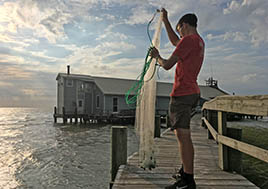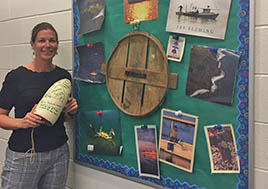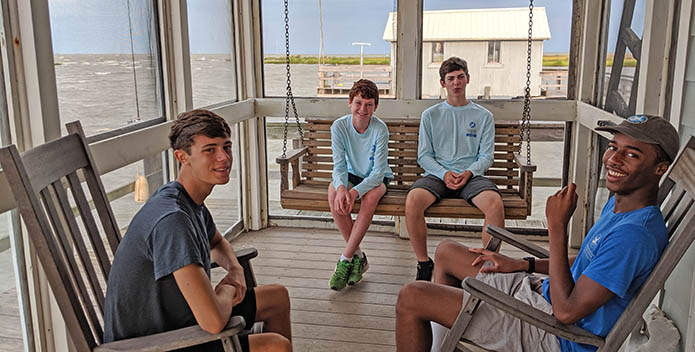It's no secret Fox Island is a magical place, suspended between the waters of Tangier and Pocomoke Sounds. The weathered hunting lodge and its surrounding salt marshes and seagrass beds connected tens of thousands of teachers and students to the Bay for more than 40 years. Here, they share their stories.
Being One With the Bay
Living on Fox Island is the closest you can get to living in the Bay itself. You not only hear the waves outside your window, but underneath you as well. Being able to sink into the marsh, gnaw on salty glasswort, and walk underneath the very room I slept in was a profoundly novel experience that cannot be replicated.
I got up close to so many plants and animals, big and small. I learned about these flora and fauna of the Bay not through pages of a book, but through catching them myself and holding them in my own hands. If given the choice between these two ways of learning about the Bay, I definitely prefer the latter. Pulling multiple eels, pufferfish, rays, and rockfish out of the water reminded me of how healthy the Bay can be and the future I'm fighting for.
Ever since I joined the Chesapeake Bay Foundation Student Bay Advisory Council, I wondered what all the hoopla about Fox Island was. Now I finally understand. I’ve learned Fox Island is not only a location, but an experience that is entirely unique to the Bay. One that is filled with joy, spontaneity, excitement, and unforgettable moments. I'll never forget seeing the sunset from the crow’s nest. The breeze was warm as my friends and I watched the sun meet the horizon in an explosion of red, purple, and yellow. Yet another Bay memory that I will always keep close to my heart.
Baba Dioum, a Senegalese environmentalist, once said, “In the end we will conserve only what we love; we will love only what we understand; and we will understand only what we are taught." Fox Island, and experiences like it, are the key to getting people my age invested in the Bay. Wonderful, hands-on learning adventures are how I, and countless others, have come to love the Bay.
The fact that Fox must be decommissioned due to the effects of climate change has made the climate crisis personal to me. Climate change has taken away one of my favorite places in the world, and I am now even more motivated to act. That majestic house on stilts is the closest I will ever get to being one with the Bay.
—Anthony Okonkwo, senior in the Global Ecology Program at Poolesville High School in Poolesville, Maryland. He has been a CBF Student Leader since 2017.

Student Leader Jon Simak prepares his fishing net early morning at Fox Island.
Jon Simak.
Bedside Fishing
This summer, on a week-long Student Leadership course, I finally got my chance to live on the beautiful, legendary Fox Island. I got to experience the nature and culture nestled in the waters of the Tangier and Pocomoke Sounds. I left with a profound sense of inspiration to conserve and protect our natural resources, but also with a sense of dread. After inspiring generations of teachers and students, the island will do so no more, and it seems there is nothing we can do about it.
Fox Island is an unforgettable place, and its greatest treasure, to me, is its biodiversity. The island’s unique position in the middle of the lower Bay, surrounded by shallow flats with deep channels cut through them, make it a great site for hundreds of fish species who call it home. The grasses and mudflats provide perfect cover for raising juvenile fish. Even in the middle of the night, a random throw of the cast net could produce tons of mullet and spot.
My most memorable Fox Island moment happened on an incoming tide, well after midnight. Dropping a line from my bedroom window and battling with 20-inch eels was not easy, and although I lost most fish, the experience of reeling in these impressive creatures will stay with me forever.
Unfortunately, the island is slowly being swallowed by the Bay. Erosion and sea level rise will bury the eels’ habitat of grasses and their burrows in the mud. The thrill of fishing for them from the bedroom windows of Fox Island will cease to exist.
Fox Island has given us so much, and now it is our time to give back. We must take the inspiration we’ve gained there and reflect on our ways of living. How can we live differently so that there are no more disappearing islands? It might seem there is nothing we can do about it, but I am confident we can make changes to protect and preserve these unique places for future generations.
—Jon Simak, senior at Richard Montgomery High School in Rockville, Maryland. He has been a CBF Student Leader since 2017 and is the president and founder of his high school Fishing and Water Conservation Club.

Teacher Katy Seman and her beloved Fox Island buoy keepsake that has traveled with her and inspired her throughout her teaching career.
Krazy Katy and the Fox Buoy
Fox Island is magical, and she captivated me in high school! I remember proggin' with Captain Dallas. He collected wild 'spargras, while I collected trash and a white buoy.
The buoy became my keepsake from the trip, with everyone's signature on it. It traveled with me to college, where I proudly displayed it in my room and told anyone who glanced in its general direction about Fox Island.
In 2003, I jumped at the chance to return to the archipelago as an intern (with my buoy in tow)! I fished, laughed, and relaxed. Upon returning to school, my heart ached for Fox Island. I wanted to kiss the fish, play in the marsh, and paddle at sunset.
After graduating, I worked on Smith Island. My buoy came, too. And then in March of 2005, my dream of returning to Fox was fulfilled. Over the next nine seasons, I would fall more in love with the rustic oasis on stilts.
I loved being surrounded by the water, shanty birds, and Captain Merrell. I loved being "Krazy Katy" and passing my exuberance for the Chesapeake on to others. I loved marsh mucking, canoeing through Cedar Island Marsh, finding seahorses, setting crab pots, finding pufferfish, enjoying sunrises from the South Porch and sunsets from the West Porch, and even raking the Clivus! I loved watching the storms approach and spotting the rainbows after they cleared.
While I was surrounded by the amazingness of Fox Island, I was longing for something more: lasting relationships with students. In December 2007, I closed the door to the lodge for the winter and said goodbye to Captain Merrell to head to Salisbury. I began my teaching career as an 8th grade science teacher and proudly displayed my buoy from high school along with an aerial picture of Fox Island.
Over the years, I've taught my students about the Chesapeake Bay and allowed them to meet Krazy Katy. If Mrs. Ghingher didn't take my high school class to Fox Island in 1997, I wouldn't be who I am today and I wouldn't be taking my students to Meredith Creek in a few weeks. Fox Island is a magical place that transforms people and plants a seed deep inside them. The Chesapeake is losing a gem, and I'm losing a little part of me.
—Katy Seman, 8th grade science teacher for Wicomico County Public Schools, on Maryland’s Eastern Shore. She worked as a CBF educator on Fox Island from 2005-2007.
Carried in Our Hearts
Imagine a place where a teacher can take students to visit that would impart firsthand knowledge about the ecological systems of the Chesapeake Bay and provide once-in-a-life time experiences. A place where they develop such an intense respect and passion for the Chesapeake Bay that they never forget its value and the value of a healthy environment. This very special place is Fox Island.
I had the amazing opportunities as a middle and high school teacher to watch students as they transformed in front of my eyes to become believers in their roles as caretakers of the Bay and everything that influenced it, including their backyards. Students made decisions about their futures based on their experiences at Fox Island. The island and the educators who worked there were the perfect storm to make all of this happen.
Time after time, I was given the unique opportunity to watch students respond in their own personal ways to their Fox Island experience, which they still carry in their hearts. I still hear from my students, who are now in their thirties and forties, about how they loved Fox Island and will never forget their experience there. Pretty amazing!
Even though Fox Island is leaving this world, it will live on in so many people’s hearts as one of the most amazing experiences in their lives. It doesn’t get much better than that!
—Patricia Ghingher, retired science teacher from Parkton, Maryland. She took her students, including Katy Seman’s high school class in 1997, to Fox Island.
The Majesty and Power of the Bay
I had the unique opportunity to learn about the Chesapeake Bay watershed through an immersive field experience. Through a combination of pre-course readings, collaborative activities and discussions, and field data collection, my classmates and I learned about the ecological, geophysical, and sociological factors that affect and are affected by the Bay.
The class really seemed to come together once we got to Fox Island. The close quarters of the Environmental Education Center forced us to interact with and depend on each other. By living on Fox Island, we also developed a sense of ownership of the Bay and could more empathetically relate to its people and animal denizens. It was for this reason, perhaps, that I spent much time contemplating the Smith and Tangier Islanders. For me, the week’s most poignant moment came when Mary Ada was telling our class about the deterioration of Smith Island due to erosion.
The field course afforded me the opportunity to see aspects of the Chesapeake Bay that I would not have seen had I visited as a tourist. We set crab pots, operated a crab scrape, and used hand nets to collect samples of Bay wildlife. I learned about several species for the first time. We explored a salt marsh on Fox Island, as well as a pelican rookery near Smith Island. I was excitedly surprised at the pelican rookery, as I had no idea that we would be so close to the birds. Finally, we observed a storm front rush up through the Bay. This dramatic weather event gave me a greater appreciation for the majesty and power of the Bay.
Leaving Fox Island was bittersweet for our group. Though there for only three days, we felt a personal bond to the place. This bond was made greater with the knowledge that we would be among the last teacher groups to stay there. Even in its retirement, it can stand as a visual testament to the continuing threat of erosion and climate change to these vanishing lands. Future CBF student and teacher groups operating out of Port Isabel will see Fox Island and hear its story. This, more than anything else, may awaken a new generation of Bay advocates. Hopefully in the Center’s sacrifice, others will see the urgency of protecting the Bay.
—Aaron Shotts, Earth Science teacher at Mechanicsburg Middle School in Cumberland County, Pennsylvania. He attended CBF’s Teachers on the Bay: Marine Ecology course in 2019.
Stay tuned for more Fox Island reflections throughout the month of October in our Farewell Fox blog series.



